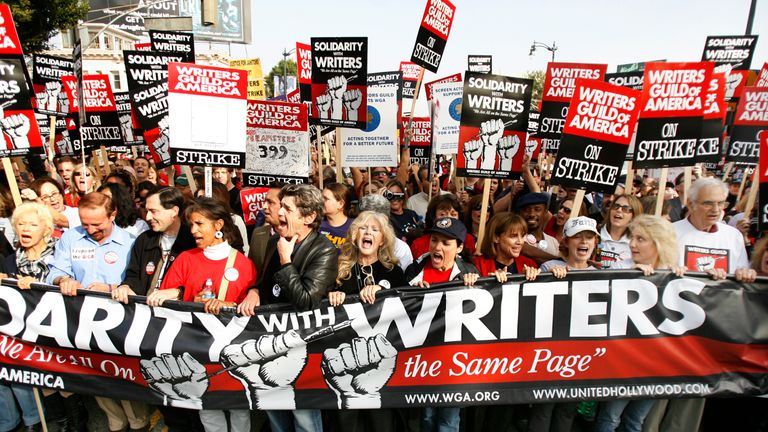
By Miguel Temas, member of the National Writers Union, for The Daily Socialist
In an era where technological advancements continue to reshape the landscape of the entertainment industry, it has become crucial for workers and their representatives to demand fair wages and work conditions. After 146 tumultuous days of striking, the Writers Guild of America (WGA) has reached a tentative agreement with major Hollywood studios, marking a beacon of hope for not only writers but the entirety of the entertainment labor force.
The proposed three-year contract seeks to address the very heart of the evolving entertainment world—streaming. Under the deal, pay rates and residuals for streaming content will see a much-needed uplift, while new regulations concerning artificial intelligence use will be instituted. “We can say, with great pride, that this deal is exceptional—with meaningful gains and protections for writers in every sector of the membership,” proclaimed the WGA’s negotiation committee, an embodiment of the tireless determination of 11,500 members who sought to right the digital age’s imbalances.
For far too long, the paradigm shift towards streaming had upended the traditional ways, threatening livelihoods, reducing job opportunities, and undervaluing the hard work of writers. However, the united stand of the WGA resonated beyond just the writers’ community. A solidarity unmatched was displayed when actors, under the SAG-AFTRA banner, began their strike, further intensifying the call for fair rights amidst the digital revolution.
This collective uprising wasn’t just a protest against wage issues; it was a powerful commentary on the widening economic disparities of the age. With studio executives earning colossal salaries and bonuses, the contrast could not have been starker. Statements made by corporate figureheads like Bob Iger, CEO of Walt Disney Co., became rallying cries, underlining the divide between the haves and have-nots.
The challenges that studios faced were undeniable. With traditional revenue streams depleting and enormous investments poured into competing against streaming giants like Netflix, the pressures mounted. But this in no way justified overlooking the rights of those who form the backbone of this industry—the writers, actors, and countless other workers.
The aftermath of these strikes wasn’t confined to boardrooms and negotiation tables. Local businesses tethered to the entertainment industry suffered. With major film releases delayed and popular TV shows paused, the ripple effect was felt by caterers, talent agencies, casting firms, and even the audiences who eagerly awaited fresh content.
But through it all, there was an undeniable wave of unity. The strikes saw members of various guilds come together, magnifying the voice of protest against the hegemony of studio monopolies. This unity, combined with the public’s growing awareness and support, tipped the balance.
Even though the WGA has reached a tentative agreement, the journey is far from over. The SAG-AFTRA negotiations loom large, and the industry still reels from the aftermath of the strike. But if history is any indicator, resilience, unity, and the collective might of workers can—and will—overcome the most formidable of challenges.
The WGA strike and its tentative resolution send a clear message: In the age of rapid technological advancements, the human spirit, unity, and the demand for fairness will always find a way to break through the digital storm.